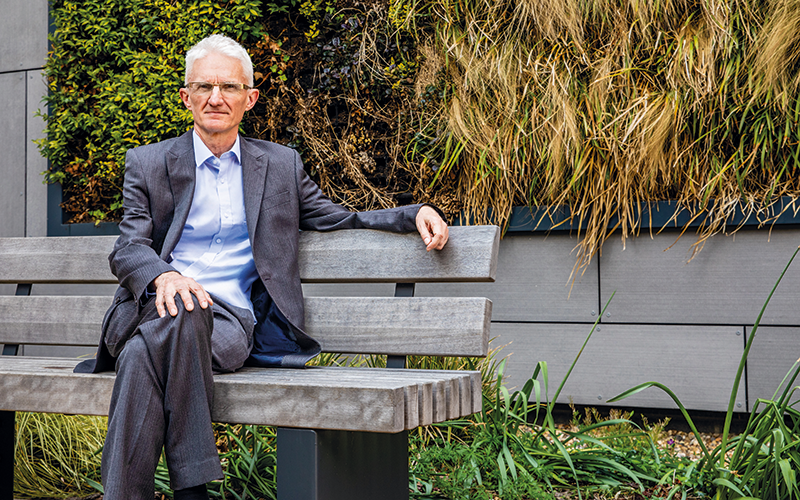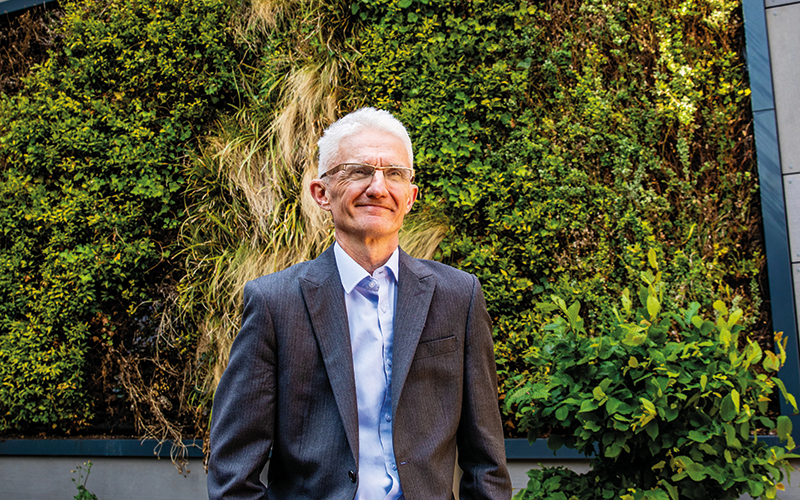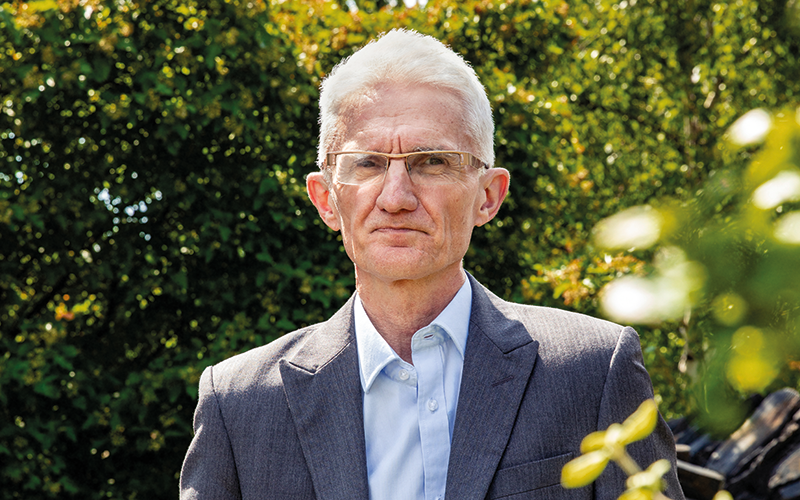
The world is changing. It’s easy to feel as though, both nationally and globally, the public sector faces a confluence of catastrophe, with security, sustainability and the social fabric all under threat. But a sense of perspective can provide a useful tonic.
CIPFA’s incoming president, Sir Mark Lowcock, whose career has taken him from the forefront of the international development sector to, more recently, leading and championing public services in his local area, reinforces the institute’s importance amid what might seem like chaos. The guidance, training and advice on offer are helpful parts of a public finance professional’s toolkit.
“During a period of such challenge, those things are vital,” he says. And there’s more the institute can do besides. “We also have an important voice amid the big challenges, such as the shift to prevention in health policy. We’ve got a lot to say about making those reforms effective.”
Sat in his office in St George’s Hospital, south-west London – perhaps best known outside the capital as the setting for Channel 4’s 24 Hours in A&E – the new president looks straight to the future.
“All of this is happening in a world where the number of global accounting bodies is likely to reduce. CIPFA has a fantastically exciting partnership with ICAEW, which we are working on taking to the next level,” he says. The partnership allows members of each institute to pursue dual membership, but that’s just the beginning of the ‘strategic alignment’ that senior figures in both organisations are looking to make the most of.
Great potential
The two institutes have differing areas of strength and expertise, Lowcock explains. “So, we see great potential for collaboration. Dual membership offers huge opportunities in terms of career benefits.”
There are plenty of things CIPFA can help with. Some problems that the public finances face in the here and now need the institute’s voice, and the sector also faces some new challenges whose effect will be felt long into the future. The role of artificial intelligence in accountancy has become a hot topic. Former chancellor Jeremy Hunt earlier this year proclaimed that accountants would become a thing of the past as technology overtakes them. Lowcock, naturally, disagrees.
“What technology has often done is got rid of unpleasant and boring work, and made space for more interesting work,” he says. “I don’t think the idea that there won’t be a hugely important role for accountants in a world with AI is particularly well thought through. There are a lot of judgments that accountants can make that will continue to be very important. I don’t see a world where that’s no longer the case.”
Those judgments are vital in the UK right now, with the public sector creaking under the weight of growing expectations. “At the moment, public services in the UK are under huge strain, where demand is increasing and costs are increasing but funding is tight. I see that in multiple parts of the public sector – in all the areas in which I now work,” says Lowcock.
“Local government faces huge pressures, including reorganisation and the reform of funding. There’s also a big issue about redressing the disastrous decision back in 2010 to abolish the Audit Commission. The new Local Audit Office is an opportunity to put that right.”
This is one of the issues that Lowcock names specifically as an opportunity for CIPFA to really exert some influence. In the past few years, English local authority audit has fallen into a dire situation, with hundreds of yearly accounts not being signed off in time. The government has taken hold of the issue and set the system on a remedial path, but future stability is still not guaranteed – and CIPFA and its members have a voice that needs to be heard.

Shining a light on scrutiny
Lowcock chaired the inquiry into Sheffield City Council’s mishandling of a situation that saw it needlessly fell thousands of healthy trees – a scandal that made national headlines. Launching the inquiry’s report in 2023, he said the council “lacked transparency, and repeatedly said things that were economical with the truth, misleading and in some cases were ultimately exposed as dishonest”.
This shines a light on just how important challenge, scrutiny and good governance can be for councils. “I have seen a little bit of what the consequences can be when things go wrong in local government,” says Lowcock, referring to the inquiry. A revitalised local audit system can help. “There’s a long road back to building capability, both in the groups who prepare financial statements and those who audit them,” he warns. “We at CIPFA can provide training and guidance, information and monitoring, continuing professional development help and bring our voice to the issue.”
Lowcock is now chair of St George’s, Epsom and St Helier University Hospitals and Health Group (GESH), and chairs an academy trust with strong provision for children with special educational needs. Both sectors face reform, and public finance professionals should be at the heart of that, he says: “Accountants are absolutely fundamental to making sure all that goes as well as it can go.”
Changes to NHS organisations, namely NHS England and integrated care boards, are already under way. “What we are focused on at GESH is how, recognising the financial pressures and performance and safety challenges, we can provide the best possible care and play our part in the government’s reform agendas of more digital care, more preventative care, more people being helped outside hospitals, and making the most of the UK’s capability in life sciences.”
These things are hardly easy, but Lowcock’s career until very recently saw him form part of a system that coincided with undeniable results. He was the longest-serving permanent secretary of the erstwhile Department for International Development (from 2011 to 2017, after having worked in the department and its predecessor since 1985), overseeing a 40% rise in the UK’s aid budget. He then moved to the United Nations to become its international development chief, heading the UN Office for the Coordination of Humanitarian Affairs from 2017 to 2021, guiding its work through the economic chaos at the start of the Covid-19 pandemic.
Next to that, reforms to NHS commissioning might seem almost like small fry. To Lowcock, at least, it provides perspective. Funding might be tight, and the issues might seem myriad, but things can be made better.
“I spent most of my life trying to improve life for people in the poorest countries in the world,” he says. “The 25 years from the late 1990s is unparalleled in human history in terms of life getting better for the world’s poorest people.
“International development and humanitarian agencies became more successful at getting help to people wherever they were, and that has saved many lives.
“These current challenges have arrived at a time when the ‘starting point’ is the highest it’s ever been. We know things can get better, because we have managed to make worse problems than our current global and national issues better.”
That doesn’t mean anything will be easy. “The combination of geopolitics and climate change and AI do present challenges,” Lowcock admits. “So while I’m optimistic about the future, I’m a clear-eyed optimist. We can continue to make life better for very many people if we decide to do that – and managing public money plays a huge role.

During our conversation, Lowcock is reticent about his views on the state of international development, having spoken about the subject at length already, including in a recent book. His leaving the sector roughly coincided with a retreat by several major donor countries, including the UK, from their aid commitment. He wants to focus on the future and his new roles, although he is “keen” to help CIPFA with its international work.
His career has taken him around the world, but the constant has been public service. He found himself in the sector at the start of his career.
“The story is, when I was in my last year at university, a friend and I sat down to talk about things we might want to do,” he tells PF. “I considered working at a bank, teacher training, becoming an accountant and the civil service fast stream. This friend said: ‘Think forward 40 years and imagine you’ve got grandchildren, and they ask what you did with your life. You need an answer that you are happy to give.’ That’s why I chose international development – because I wanted to work on things that are purposeful.”
The move to public finance was not a given early on. It happened as a result of his work as head of the DfID regional office for East Africa in Nairobi, Kenya.
‘Accidental accountant’
“I was an accidental accountant, really,” he explains. “Living and working in Africa, I was appointed in 2001 to be DfID’s finance director. Within a few days of starting that job, I was visited by the director of the National Audit Office responsible for international development, during the transition from cash to accrual accounting. He said the shadow accounts my team had prepared were not good enough even to be qualified – they would have been disclaimed. I confess I didn’t really know what those words meant.
“It became clear that we would need to build a proper finance function. So I trained through CIPFA.”
Thus continued the journey towards permanent secretary and beyond – but now his field of vision, geographically at least, has narrowed somewhat.
“This is my local area. My family gets our health care in south-west London. At this stage of my life, I’m trying to do work that’s local to me. I am, basically, a public servant. I like doing things for the public good that make a difference.
“There are really brilliant, committed people here [at CIPFA] who really care about what they do. That’s one of the things I’ve really enjoyed in the few months I’ve been here.”



















